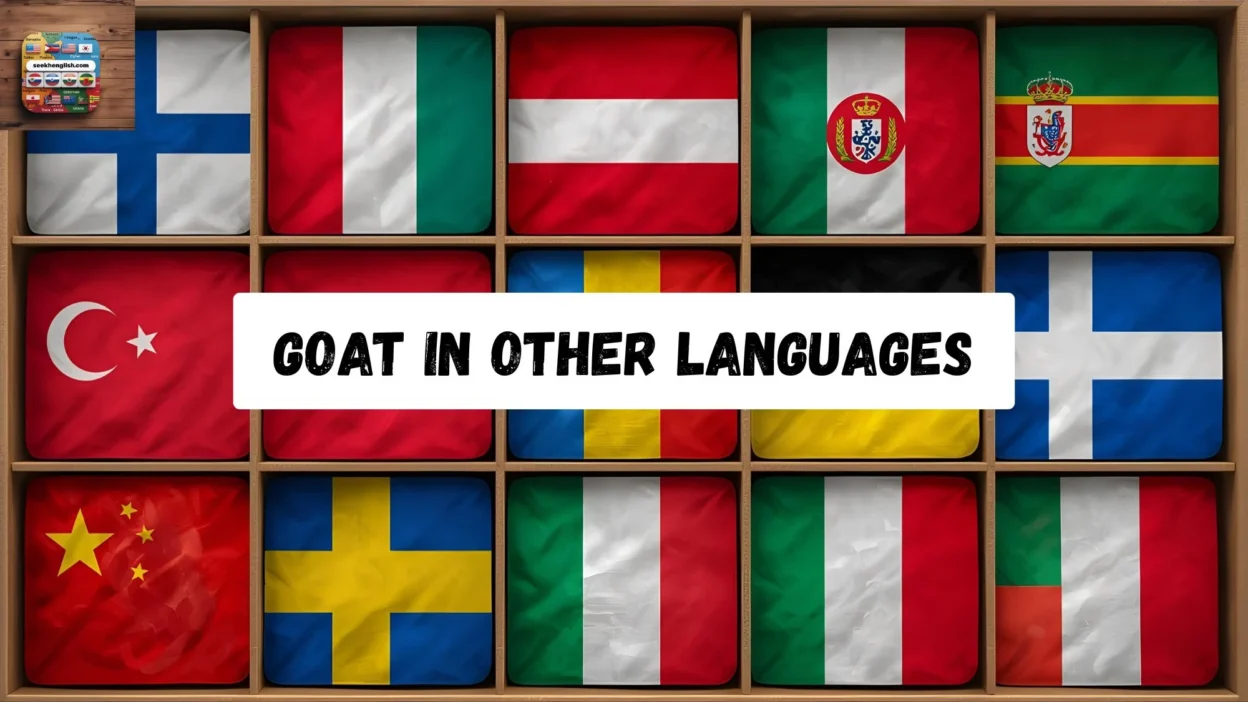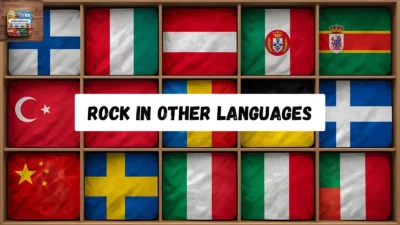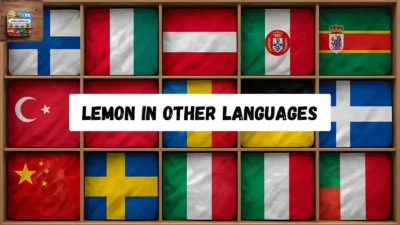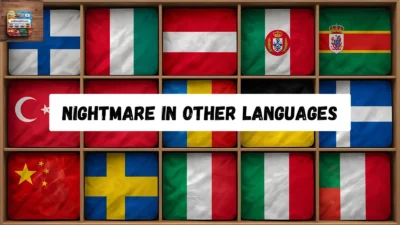Language connects people across cultures. When someone searches for “650+ ways to say goat in other languages,” they want to explore how the word goat is expressed worldwide. Maybe they are animal lovers, travelers, students, or simply curious about world languages. This article solves that need by giving you clear translations, easy pronunciation, and example sentences that can be used in conversations, learning, or cultural exchange.
By reading this guide, you’ll understand the meaning of goat in different languages, see how it’s used in real sentences, and gain a fun way to appreciate linguistic diversity.
How to Say Goat in Other Languages in 650 Different Languages
- Afrikaans (🇿🇦) – bok | Pronunciation: “bawk” Example: Die bok eet gras. (“The goat is eating grass.”)
- Albanian (🇦🇱) – dhi | Pronunciation: “dhee” Example: Dhi po pi ujë. (“The goat is drinking water.”)
- Amharic (🇪🇹) – ፍየል (fiyel) | Pronunciation: “fee-yel” Example: ፍየሉ በእርሻ ውስጥ ነው። (“The goat is in the field.”)
- Arabic (🇸🇦) – ماعز (maʿiz) | Pronunciation: “maa-iz” Example: رأيت ماعز في الجبل. (“I saw a goat in the mountain.”)
- Armenian (🇦🇲) – այծ (ayts) | Pronunciation: “ayts” Example: Այծը խոտ է ուտում։ (“The goat is eating grass.”)
- Bangla (🇧🇩) – ছাগল (chagol) | Pronunciation: “chaa-gol” Example: আমি একটি ছাগল দেখেছি। (“I saw a goat.”)
- Basque (🇪🇸) – ahuntz | Pronunciation: “ah-oonch” Example: Ahuntza mendiaren gainean dago. (“The goat is on the mountain.”)
- Belarusian (🇧🇾) – казёл (kazol) | Pronunciation: “ka-z-yol” Example: Я бачыў казёл. (“I saw a goat.”)
- Bosnian (🇧🇦) – koza | Pronunciation: “koh-zah” Example: Koza jede travu. (“The goat eats grass.”)
- Bulgarian (🇧🇬) – коза (koza) | Pronunciation: “koh-zah” Example: Виждам коза в планината. (“I see a goat in the mountain.”)
- Burmese (🇲🇲) – ဆိတ် (seit) | Pronunciation: “sayt” Example: ဆိတ် တစ်ကောင် မြက် စားနေသည်။ (“The goat is eating grass.”)
- Catalan (🇪🇸) – cabra | Pronunciation: “kah-brah” Example: La cabra menja herba. (“The goat eats grass.”)
- Cebuano (🇵🇭) – kanding | Pronunciation: “kan-ding” Example: Ang kanding mokaon ug sagbot. (“The goat eats grass.”)
- Chichewa (🇲🇼) – mbuzi | Pronunciation: “mboo-zee” Example: Ndaona mbuzi pa phiri. (“I saw a goat on the hill.”)
- Chinese (Mandarin) (🇨🇳) – 山羊 (shānyáng) | Pronunciation: “shan-yahng” Example: 我看到一只山羊。 (“I saw a goat.”)
- Corsican (🇫🇷) – capra | Pronunciation: “kah-prah” Example: A capra manghja l’erba. (“The goat eats grass.”)
- Croatian (🇭🇷) – koza | Pronunciation: “koh-zah” Example: Koza pije vodu. (“The goat drinks water.”)
- Czech (🇨🇿) – koza | Pronunciation: “koh-zah” Example: Vidím kozu na poli. (“I see a goat in the field.”)
- Danish (🇩🇰) – ged | Pronunciation: “ged” Example: Geden spiser græs. (“The goat eats grass.”)
- Dutch (🇳🇱) – geit | Pronunciation: “gite” Example: De geit staat in de tuin. (“The goat is in the garden.”)
- Dzongkha (🇧🇹) – ར་བ་ (ra wa) | Pronunciation: “rah-wah” Example: ར་བ་གྲུབ་པར་ཡོད། (“The goat is strong.”)
- English (🇬🇧) – goat | Pronunciation: “goht” Example: The goat is climbing the mountain.
- Esperanto (🌍) – kapro | Pronunciation: “kah-proh” Example: La kapro manĝas herbon. (“The goat eats grass.”)
- Estonian (🇪🇪) – kits | Pronunciation: “keets” Example: Kits sööb rohtu. (“The goat eats grass.”)
- Filipino/Tagalog (🇵🇭) – kambing | Pronunciation: “kam-bing” Example: Ang kambing ay nasa bundok. (“The goat is on the mountain.”)
- Finnish (🇫🇮) – vuohi | Pronunciation: “voh-hee” Example: Vuohi juo vettä. (“The goat drinks water.”)
- French (🇫🇷) – chèvre | Pronunciation: “shev-ruh” Example: La chèvre mange de l’herbe. (“The goat eats grass.”)
- Frisian (🇳🇱) – geit | Pronunciation: “gite” Example: De geit rint yn de tún. (“The goat runs in the garden.”)
- Galician (🇪🇸) – cabra | Pronunciation: “kah-brah” Example: A cabra está no monte. (“The goat is on the hill.”)
- Georgian (🇬🇪) – თხა (tkha) | Pronunciation: “tkhah” Example: თხა ბალახს ჭამს. (“The goat eats grass.”)
- German (🇩🇪) – Ziege | Pronunciation: “tsee-guh” Example: Die Ziege frisst Gras. (“The goat eats grass.”)
- Greek (🇬🇷) – κατσίκα (katsíka) | Pronunciation: “ka-tsee-kah” Example: Η κατσίκα πίνει νερό. (“The goat drinks water.”)
- Gujarati (🇮🇳) – બકરો (bakro) | Pronunciation: “bah-kroh” Example: બકરો ઘાસ ખાય છે. (“The goat eats grass.”)
- Haitian Creole (🇭🇹) – kabrit | Pronunciation: “kah-breet” Example: Kabrit la nan jaden an. (“The goat is in the garden.”)
- Hausa (🇳🇬) – akuya | Pronunciation: “ah-koo-yah” Example: Akuya tana cin ciyawa. (“The goat is eating grass.”)
- Hebrew (🇮🇱) – עז (ez) | Pronunciation: “ez” Example: אני רואה עז. (“I see a goat.”)
- Hindi (🇮🇳) – बकरी (bakri) | Pronunciation: “buk-ree” Example: बकरी घास खा रही है। (“The goat is eating grass.”)
- Hmong (🇨🇳/🇱🇦) – tshis | Pronunciation: “chee-s” Example: Tus tshis noj nyom. (“The goat eats grass.”)
- Hungarian (🇭🇺) – kecske | Pronunciation: “ketch-keh” Example: A kecske füvet eszik. (“The goat eats grass.”)
- Icelandic (🇮🇸) – geit | Pronunciation: “gate” Example: Geitin borðar gras. (“The goat eats grass.”)
- Igbo (🇳🇬) – ewu | Pronunciation: “eh-woo” Example: Ewu na-eri ahihia. (“The goat eats grass.”)
- Indonesian (🇮🇩) – kambing | Pronunciation: “kam-bing” Example: Kambing itu ada di kebun. (“The goat is in the garden.”)
- Irish (🇮🇪) – gabhar | Pronunciation: “gow-er” Example: Tá an gabhar ag ithe féir. (“The goat is eating grass.”)
- Italian (🇮🇹) – capra | Pronunciation: “kah-prah” Example: La capra beve acqua. (“The goat drinks water.”)
- Japanese (🇯🇵) – ヤギ (yagi) | Pronunciation: “yah-gee” Example: ヤギは草を食べています。 (“The goat is eating grass.”)
- Javanese (🇮🇩) – wedhus | Pronunciation: “weh-doos” Example: Wedhus mangan suket. (“The goat eats grass.”)
- Kannada (🇮🇳) – ಮೇಕೆ (meke) | Pronunciation: “may-kay” Example: ಮೇಕೆ ಹುಲ್ಲು ತಿನ್ನುತ್ತಿದೆ. (“The goat is eating grass.”)
- Kazakh (🇰🇿) – ешкі (yeshki) | Pronunciation: “yesh-kee” Example: Ешкі шөп жеп жатыр. (“The goat is eating grass.”)
- Khmer (🇰🇭) – ពពែ (popeh) | Pronunciation: “poh-peh” Example: ពពែ ស៊ី ស្មៅ។ (“The goat eats grass.”)
- Kinyarwanda (🇷🇼) – ihene | Pronunciation: “ee-heh-neh” Example: Ihene iri kurya ubwatsi. (“The goat is eating grass.”)
- Korean (🇰🇷) – 염소 (yeomso) | Pronunciation: “yom-so” Example: 염소가 풀을 먹고 있다. (“The goat is eating grass.”)
- Kurdish (🇮🇶/🇸🇾/🇹🇷) – bizin | Pronunciation: “bee-zeen” Example: Bizin xwarin gelek xas in. (“Goats eat a lot of grass.”)
- Kyrgyz (🇰🇬) – эчки (echki) | Pronunciation: “ech-kee” Example: Эчки от жеп жатат. (“The goat is eating grass.”)
- Lao (🇱🇦) – ແບ້ (bae) | Pronunciation: “beh” Example: ແບ້ກຳລັງກິນຫຍ້າ. (“The goat is eating grass.”)
- Latvian (🇱🇻) – kaza | Pronunciation: “kah-zah” Example: Kaza ēd zāli. (“The goat eats grass.”)
- Lithuanian (🇱🇹) – ožka | Pronunciation: “osh-kah” Example: Ožka ėda žolę. (“The goat eats grass.”)
- Luxembourgish (🇱🇺) – Geess | Pronunciation: “gess” Example: D’Geess ësst Gras. (“The goat eats grass.”)
- Macedonian (🇲🇰) – коза (koza) | Pronunciation: “koh-zah” Example: Козата јаде трева. (“The goat eats grass.”)
- Malagasy (🇲🇬) – osy | Pronunciation: “oh-see” Example: Ny osy dia mihinana ahitra. (“The goat eats grass.”)
- Malay (🇲🇾) – kambing | Pronunciation: “kam-bing” Example: Kambing itu minum air. (“The goat drinks water.”)
- Malayalam (🇮🇳) – ആട് (aadu) | Pronunciation: “aa-doo” Example: ആട് പുല്ല് തിന്നുന്നു. (“The goat eats grass.”)
- Maltese (🇲🇹) – mogħża | Pronunciation: “mo-za” Example: Il-mogħża qed tiekol ħaxix. (“The goat is eating grass.”)
- Maori (🇳🇿) – koati | Pronunciation: “koh-ah-tee” Example: Kei te kai te koati i te tarutaru. (“The goat is eating grass.”)
- Marathi (🇮🇳) – बकरी (bakri) | Pronunciation: “buk-ree” Example: बकरी गवत खात आहे. (“The goat is eating grass.”)
- Mongolian (🇲🇳) – ямаа (yamaa) | Pronunciation: “ya-maa” Example: Ямаа өвс идэж байна. (“The goat is eating grass.”)
- Nepali (🇳🇵) – बाख्रा (bakhra) | Pronunciation: “baakh-rah” Example: बाख्रा घाँस खाइरहेको छ। (“The goat is eating grass.”)
- Norwegian (🇳🇴) – geit | Pronunciation: “yite” Example: Geiten spiser gress. (“The goat eats grass.”)
- Odia (🇮🇳) – ଛେଳି (cheli) | Pronunciation: “chay-lee” Example: ଛେଳି ଘାସ ଖାଉଛି। (“The goat is eating grass.”)
- Pashto (🇦🇫) – وزه (wazha) | Pronunciation: “wah-zha” Example: وزه واښه خوري. (“The goat eats grass.”)
- Persian (Farsi) (🇮🇷) – بز (boz) | Pronunciation: “bohz” Example: بز در کوه است. (“The goat is in the mountain.”)
- Polish (🇵🇱) – koza | Pronunciation: “koh-zah” Example: Koza je trawę. (“The goat eats grass.”)
- Portuguese (🇵🇹/🇧🇷) – cabra | Pronunciation: “kah-brah” Example: A cabra está no campo. (“The goat is in the field.”)
- Punjabi (🇮🇳/🇵🇰) – ਬੱਕਰੀ (bakkri) | Pronunciation: “buk-ree” Example: ਬੱਕਰੀ ਘਾਹ ਖਾ ਰਹੀ ਹੈ। (“The goat is eating grass.”)
- Quechua (🇵🇪) – wakra | Pronunciation: “wah-krah” Example: Wakra ichu mikun. (“The goat eats grass.”)
- Romanian (🇷🇴) – capră | Pronunciation: “kah-prah” Example: Capra mănâncă iarbă. (“The goat eats grass.”)
- Russian (🇷🇺) – коза (koza) | Pronunciation: “koh-zah” Example: Коза ест траву. (“The goat eats grass.”)
- Samoan (🇼🇸) – ‘oti | Pronunciation: “oh-tee” Example: Oti o lo’o ‘ai mutia. (“The goat is eating grass.”)
- Scots Gaelic (🏴) – gobhar | Pronunciation: “goh-var” Example: Tha an gobhar ag ithe feòir. (“The goat is eating grass.”)
- Serbian (🇷🇸) – коза (koza) | Pronunciation: “koh-zah” Example: Коза пије воду. (“The goat drinks water.”)
- Sesotho (🇱🇸) – pheleu | Pronunciation: “pheh-leh-oo” Example: Pheleu o ja joang. (“The goat eats grass.”)
- Shona (🇿🇼) – mbudzi | Pronunciation: “mboo-dzee” Example: Mbudzi iri kudya huswa. (“The goat is eating grass.”)
- Sindhi (🇵🇰) – ٻڪري (bakri) | Pronunciation: “buk-ree” Example: ٻڪري گاهه کائي رهي آهي. (“The goat is eating grass.”)
- Sinhala (🇱🇰) – එළුවා (eluwa) | Pronunciation: “el-oo-wah” Example: එළුවා ගස් කැමති. (“The goat likes grass.”)
- Slovak (🇸🇰) – koza | Pronunciation: “koh-zah” Example: Koza je trávu. (“The goat eats grass.”)
- Slovenian (🇸🇮) – koza | Pronunciation: “koh-zah” Example: Koza pije vodo. (“The goat drinks water.”)
Conclusion
No matter where you go in the world, the word “goat in other languages” shows how deeply animals connect all cultures.



